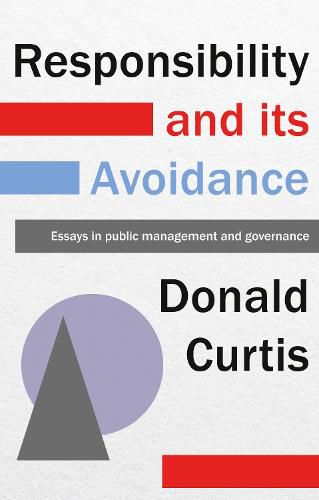Readings Newsletter
Become a Readings Member to make your shopping experience even easier.
Sign in or sign up for free!
You’re not far away from qualifying for FREE standard shipping within Australia
You’ve qualified for FREE standard shipping within Australia
The cart is loading…






This title is printed to order. This book may have been self-published. If so, we cannot guarantee the quality of the content. In the main most books will have gone through the editing process however some may not. We therefore suggest that you be aware of this before ordering this book. If in doubt check either the author or publisher’s details as we are unable to accept any returns unless they are faulty. Please contact us if you have any questions.
We live in anxious times, all too aware that governments can fail, markets too collapse and that NGOs, parties and other organisations in civil society are also prone to lose sight of the common good. Responsibility and its Avoidance seeks to understand the dynamic processes through which people struggle to produce a sound environment, stable trading arrangements, competent governance, personal security and other aspects of a ‘liveable society’. In Responsibility and its Avoidance, Donald Curtis brings a practitioner focus as a project manager in development to his essays, as well as a UK and World citizen concern for current social dilemmas. He seeks and occasionally finds, enlightenment in academic theory but, aware that contradictions in governance are as old as history, sometimes seeks solace in other people’s cultures or in literature. A key finding is that good governance is a matter of exercised responsibility. What emerged, through the themes of the various chapters, is that society’s attempts to create constitutions, governance structures and management processes through which leaders and citizens can exercise responsibility for the public good, run up against an avoidance paradox. As soon as an agreed allocation of responsibilities is achieved, with obligations and commitments set out and accountability processes established, perverse incentives set in. Common purpose can always be deemed personally costly, encouraging neglect, manipulation, avoidance or other forms of negation. The socially concerned citizen must commit to constant struggle against institutional decay and corruption; so runs Curtis’ thesis: responsibility is not good unless it is shared.
$9.00 standard shipping within Australia
FREE standard shipping within Australia for orders over $100.00
Express & International shipping calculated at checkout
This title is printed to order. This book may have been self-published. If so, we cannot guarantee the quality of the content. In the main most books will have gone through the editing process however some may not. We therefore suggest that you be aware of this before ordering this book. If in doubt check either the author or publisher’s details as we are unable to accept any returns unless they are faulty. Please contact us if you have any questions.
We live in anxious times, all too aware that governments can fail, markets too collapse and that NGOs, parties and other organisations in civil society are also prone to lose sight of the common good. Responsibility and its Avoidance seeks to understand the dynamic processes through which people struggle to produce a sound environment, stable trading arrangements, competent governance, personal security and other aspects of a ‘liveable society’. In Responsibility and its Avoidance, Donald Curtis brings a practitioner focus as a project manager in development to his essays, as well as a UK and World citizen concern for current social dilemmas. He seeks and occasionally finds, enlightenment in academic theory but, aware that contradictions in governance are as old as history, sometimes seeks solace in other people’s cultures or in literature. A key finding is that good governance is a matter of exercised responsibility. What emerged, through the themes of the various chapters, is that society’s attempts to create constitutions, governance structures and management processes through which leaders and citizens can exercise responsibility for the public good, run up against an avoidance paradox. As soon as an agreed allocation of responsibilities is achieved, with obligations and commitments set out and accountability processes established, perverse incentives set in. Common purpose can always be deemed personally costly, encouraging neglect, manipulation, avoidance or other forms of negation. The socially concerned citizen must commit to constant struggle against institutional decay and corruption; so runs Curtis’ thesis: responsibility is not good unless it is shared.